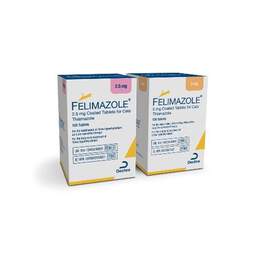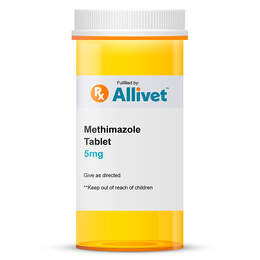Cat Thyroid Medications
The most common endocrine disorder in cats is hyperthyroidism. Also known as thyrotoxicosis, this condition occurs when the thyroid gland enlarges and starts producing too much thyroid hormone. The most common cause is a non-cancerous tumor on one or both thyroid glands. Most cats diagnosed with hyperthyroidism are older than ten.
Causes of Cat Hyperthyroidism
The most common cause of hyperthyroidism in cats is a high number of benign cells in the thyroid gland. When these cells form clusters of small nodules on the thyroid gland, they are called adenomas and can affect the functioning of both or one of the lobes of the thyroid gland.
Other causes of hyperthyroidism include:
- Malignant cells that develop on the thyroid gland lobes. This is the least common cause of hyperthyroidism in felines.
- Malignant or benign or malignant growths near the pituitary gland.
- Immune system diseases.
- Changes in the cat's environment.
Signs of Hyperthyroidism in Cats
The signs of hyperthyroidism are usually subtle at first and become increasingly severe as the disease gets worse. Sign to look out for include:
- Unexplained weight loss
- Increased appetite
- Nervousness or irritability
- Frequent vomiting
- Poor coat condition
- Diarrhea
- Rapid heart rate
- Excessive thirst (polydipsia)
- Excessive and urination (polyuria)
- Vocalizing
- Occasionally difficulty breathing
- Occasionally depression
- Occasionally weakness
Not every cat develops every symptom, and about 20% of cats with hyperthyroidism will be depressed and sluggish. If your cat has one or more, they may be developing hyperthyroidism, and you should make an appointment with your veterinarian as soon as possible to determine the cause of their symptoms.
Diagnosing Hyperthyroidism in Cats
When you take your cat to the veterinarian, they will perform a physical exam and order a blood test to check their thyroid hormone levels. The veterinarian will feel your cat's neck area to see if their glands are enlarged. They will also check your cat's heart rate and rhythm since some cats with hyperthyroidism may also develop secondary cardiac problems.
In addition, your veterinarian will ask questions about your cat's appetite, check their weight, and discuss other symptoms you have noticed. Based on this exam, your vet will decide whether to order bloodwork and check your cat's thyroid hormone level to confirm their diagnosis.
Older cats may have hyperthyroidism even if their thyroid hormone levels are normal. Your veterinarian will order a more comprehensive test to confirm the diagnosis.
Hyperthyroidism often mimics the symptoms of liver disease or chronic kidney disease. In these instances, your veterinarian may test your cat's blood count, blood chemistry panel, and urinalysis to check for abnormalities that indicate these two diseases. Also, hyperthyroid disease can predispose your cat to other conditions such as hypertension or hypertrophic cardiomyopathy (HCM). Your vet may take chest x-rays, an electrocardiogram (EKG), and blood pressure to rule these issues out. The results of your tests will determine the treatment you.
Treatment with Cat Thyroid Medication
The most commonly used cat thyroid medication is Felimazole, an oral antithyroid medicine also known as the generic methimazole. This drug helps control the cat's production of thyroid hormones from the affected gland(s). Developed for human use, methimazole is currently the medication of choice for treating overactive thyroid in cats. The drug is not a cure, it is a treatment, so it has to be administered once or twice a day for life. It also requires routine blood tests to monitor your can's thyroid hormone levels.
The dosage of cat thyroid medication starts out low and may be increased, depending on how the cat reacts to it and its effect on their condition. After 2-3 weeks, their thyroid hormone levels must be re-tested to see if the amount of medication is appropriate.
If the dosage is too high, the cat's body may not produce enough thyroid hormones and develop hypothyroidism. Regular checkups to monitor the cat's thyroid levels and recalibrate the dosage, if appropriate, are required.
Some cats may have side effects from medication, including:
- Vomiting
- Anorexia
- Fever
- Anemia
- Lethargy
- Rash due to allergy to the drug
- Liver damage and bone marrow suppression with long term use (rare)
Advantages of Cat Thyroid Medication
- Non-invasive treatment
- Relatively inexpensive, costs can add up over time
- Only treatment option available for cats with hypertrophic cardiomyopathy or kidney disease
Disadvantages of Cat Thyroid Medication
- Continuous observation and tests by your veterinarian.
- The medication has no effect on the tumor, so it may keep growing.
Cat thyroid medication cannot completely cure the cat's condition, it only controls the level of thyroid hormones the cat's body produces. However, it can be used long-term to manage the condition and maintain the cat's quality of life.
How to Administer Cat Thyroid Medication
Follow your veterinarian's instructions when giving this medication to your cat. If you miss a dose, give your cat the missed dose as soon as you remember it. If it is close to the next scheduled dose, stick to the regular schedule. Do not try to catch up by doubling the dosage.
Methimazole has a very bitter taste, hiding the medication in food or a pill pocket can make it easier to administer. Pill pockets come in salmon or chicken flavors and can be given as a treat. The tablets should not be cut with bare hands. Wash your hands with soap and water after handling the pills.
Drug Interactions
Before beginning treatment, review any medications or supplements your cat may be taking with your veterinarian. Some drugs, such as anticoagulants, may not work as well when taken with methimazole.
On-Going Care for Hyperthyroid Cats
Once treatment has begun, your veterinarian will need to reexamine your cat every two to three weeks during the first three months of treatment, with a complete blood count to check their T4. In one to three weeks, the cat's naturally produced thyroid hormone levels should be lower.
The methimazole dosage will be recalibrated based on the test results until the cat's T4 concentration remains in the low-normal range. When your cat is stabilized on this medication, blood tests to check thyroid hormone levels are performed approximately every three to six months. Additional blood tests to monitor liver function and immune system function may also be performed.



